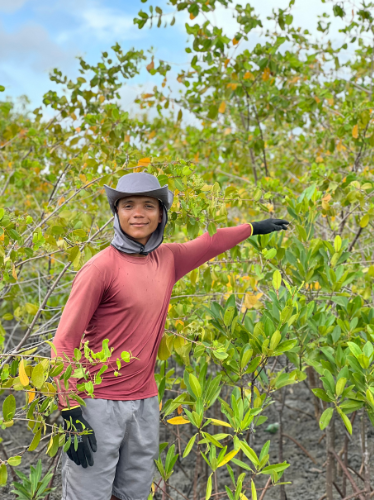Restoring Mangroves and Hope in Maranhão

April 10, 2025

Maranhão, one of Brazil’s poorest states, faces significant socio-economic challenges, particularly in rural areas. The region of Primera Cruz, where veritree is focusing its restoration efforts, is no exception. Home to a population that relies heavily on fishing and family farming, this region is marked by economic hardship, with limited access to resources and essential services. As of recent data, Maranhão has the lowest Human Development Index (HDI) in Brazil, with around 40% of the population living below the poverty line.
Despite these hardships, the people of Maranhão, particularly in regions like Primera Cruz and Premedicos, show remarkable resilience. These strong Quilombola communities, largely descendants of enslaved Africans from the 19th century, have endured systemic socio-economic inequality, fighting for access to land and better opportunities. With a strong cultural heritage and a deep connection to the land, they are ready to turn the tide.

veritree is dedicated to restoring degraded ecosystems, and creating sustainable livelihoods. Our work is bringing opportunity to communities who have long been marginalized and overlooked.
The mangrove ecosystem is a vital part of the coastal landscape in Maranhão. Mangroves provide shelter for marine life, prevent coastal erosion, and help maintain the balance of the entire ecosystem. Unfortunately, years of environmental degradation, including the conversion of mangrove areas into salt pans for salt extraction, and the cutting of mangrove trees for charcoal, have taken a significant toll.
Together with our local planting partner, we are working to reverse this damage. Our plan is to plant 10 million trees over 1k hectares, revitalizing ecosystems that directly benefit the local communities. Healthy mangrove forests are essential not only for biodiversity but also for ensuring the stability of fisheries, a vital food source and livelihood for the people in the region.

As the mangroves recover, a positive ripple effect is being seen throughout the ecosystem. The return of manatees to the area is one of the most exciting indicators of success. These marine mammals are a clear sign that the water quality and habitat conditions are improving, showcasing the direct relationship between ecological restoration and the well-being of the community.
The increase in crab populations is another positive outcome. Crabs are an important resource for local fishermen, and the boost in their numbers directly supports food security and local economies. Similarly, the recovery of bird species—especially the iconic Scarlet Ibis, which thrives in healthy mangrove forests—is a testament to the improving environmental health and the return of critical species.

Beyond the clear environmental benefits, we recognize that true, lasting change empowers local communities. This project is as much about people as it is about nature, creating opportunities and building a brighter future together. We aim to boost local employment in Maranhão through our restoration project, with a focus on the Quilombola communities, and also ensure that women fill at least 50% of the new positions.
Training programs are key to this empowerment, ensuring that community members gain valuable skills in environmental monitoring, seed collection, and marketing. By providing both immediate job opportunities and long-term career development, veritree is helping build a stronger, more self-sufficient community. João, a 21-year-old from a fishing family, demonstrates how inherited ecological understanding fuels impactful restoration. He's leading monitoring efforts and wants to pursue environmental studies to further build on his growing expertise and contribute to a sustainable future.

Our local planting partner is also helping people navigate government programs, improving their financial literacy and access to resources like Bolsa Família – support program for low-income families. This ensures that the local community can better manage their income, access aid during off-seasons, and achieve greater economic stability.
Eventually, as the ecosystem recovers, ecotourism will offer another path to sustainable income for the local community. Birdwatching, especially focused on the Scarlet Ibis, is gaining popularity.
Ecotourism provides a unique opportunity for the people of Maranhão to share their region’s beauty and biodiversity with visitors while ensuring that this income supports ongoing environmental stewardship. The combination of ecotourism and restoration creates a powerful cycle, where the community benefits financially while contributing to the protection and restoration of their land.
Transparency and trust are paramount to this restoration effort, and veritree's technology plays a crucial role. Our Collect App empowers on-the-ground planters to provide geolocated data, track progress, and share visual updates like photos and videos. Geospatial layers also inform our planting efforts, helping us identify areas that need the most attention and ensuring resources are deployed effectively. This detailed information is then made available to our corporate partners through their impact dashboards, providing them with impact data and compelling stories so they can report and share their environmental impact with confidence.
The work being done in Maranhão is a shining example of how community-driven restoration efforts can heal the land, create new economic opportunities, and foster long-term sustainability. veritree’s focus on biodiversity restoration, ecotourism, and community empowerment is transforming Maranhão into a place of hope, where both the people and the environment are thriving.
veritree's work goes beyond ecosystem restoration; it's about building a future where communities and nature thrive together. We're proving that collective, purposeful action can create a truly sustainable world.
Inspired by this story of resilience and transformation? Join us in supporting local communities of Maranhão as they forge a brighter, more sustainable path forward. Reach out today.
PREV BLOG